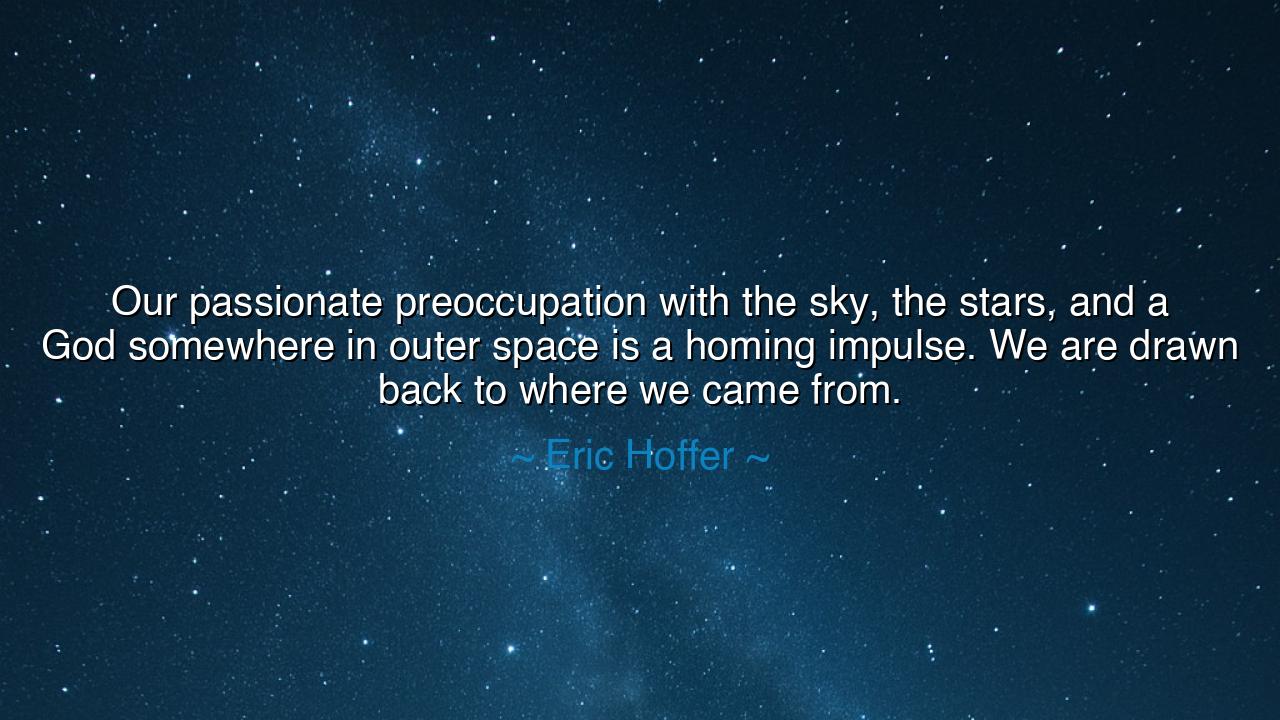
Our passionate preoccupation with the sky, the stars, and a God
Our passionate preoccupation with the sky, the stars, and a God somewhere in outer space is a homing impulse. We are drawn back to where we came from.






In the deepest corners of the human soul, there has always been a longing—a yearning—that reaches far beyond the earthly and the familiar. It is a passionate preoccupation, an ancient pull that drives us to gaze upon the sky, to ponder the stars, and to seek out a God or force somewhere in the infinite expanse of space. Eric Hoffer, the profound philosopher of human nature, spoke of this as a homing impulse, a force that draws us back to where we came from. "We are drawn back to where we came from." These words carry with them the ancient understanding that, in our very essence, we are connected to the cosmos, and it is in our nature to return to the source—to the place from which we once emerged.
For the ancient Greeks, the stars were not merely distant lights in the sky, but the gods themselves, residing in the heavens, weaving the fate of humanity. The Greek philosopher Plato spoke of the soul's journey, of how the spirit is connected to a higher world, a world of perfection, from which it descends and to which it must ultimately return. This yearning for the divine, for the stars, is not a modern fantasy but a deep, timeless desire for reconnection with the divine source. The ancients understood that the human being is not a creature defined by mere flesh, but by the invisible, the spiritual, and the cosmic forces that bind all things together. In that sense, to look upward, to yearn for the stars, is to acknowledge the truth of our origin, a truth known to civilizations long before the age of rockets and telescopes.
Indeed, history shows us that this longing to return to the stars is not a new phenomenon. In ancient Egypt, the pharaohs built their monumental pyramids not merely as tombs, but as gateways to the heavens. The Egyptian belief in the afterlife was grounded in the idea that the soul would return to the stars, to join the gods and the ancestors. The Great Pyramid of Giza was constructed with such precision that it aligned perfectly with the constellations, especially Orion, which was believed to be the celestial home of the god Osiris. The pharaohs were not just kings of the Earth, but were seen as divine beings destined to return to their heavenly origins, drawn upward by the very same impulse that Hoffer speaks of—a homing impulse, a deep connection to the cosmos that transcends time and space.
Consider the great explorers of the Age of Discovery, like Christopher Columbus or Ferdinand Magellan, who sailed into the unknown not merely to expand their empires, but to uncover the mysteries of the world. They, too, were driven by a longing to return to the unknown, to chart the stars, to find the edges of the world. Their expeditions were not just acts of conquest; they were acts of discovery, quests to reconnect with the cosmos, to learn how humanity fits into the vast and mysterious web of the world. In many ways, the space race of the 20th century—when humankind first left the cradle of Earth and set foot on the moon—was the latest chapter in an ancient saga. Just as Magellan sailed across the oceans, the astronauts of Apollo 11 sailed into the heavens, guided by the same yearning for something greater than themselves.
Hoffer’s insight into the human desire for the stars is a reminder of our deep connection to the cosmos. It is a reminder that we are not isolated creatures on a small blue planet, but part of an infinite, ever-expanding universe. This longing to reach for the stars, to seek the divine in the heavens, is not just a scientific curiosity, but a deeply spiritual and existential need. The homing impulse that Hoffer describes is an ancient and essential part of our nature—a part that is often ignored in the daily grind of life. Yet, it is through this yearning, this looking upward, that we find meaning. We do not just look at the stars for answers, but because they remind us of our origins, our connection to something greater than ourselves.
The lesson here is not merely about science or exploration; it is about awareness. We must recognize the sacred connection between our earthly existence and the cosmos. We must remember that we are part of something far larger than ourselves, and it is in this awareness that we find our true purpose. The stars, the heavens, and the idea of a divine origin are not just matters of old mythology or distant dreams, but are woven into the fabric of our humanity. To gaze at the stars is to look within, to search for a deeper truth about who we are and where we come from.
So, let us take Hoffer’s words to heart. Let us embrace the homing impulse within us, the call to reach for the stars and reconnect with the universe. Whether we are embarking on a journey of discovery, whether we are seeking spiritual enlightenment, or simply exploring the vastness of the world around us, let us remember that the path forward is not one of separation but of return—a return to the knowledge of our origins, to the deep cosmic connection that binds us all. And in that return, we will find not just the universe, but our true selves.






AAdministratorAdministrator
Welcome, honored guests. Please leave a comment, we will respond soon